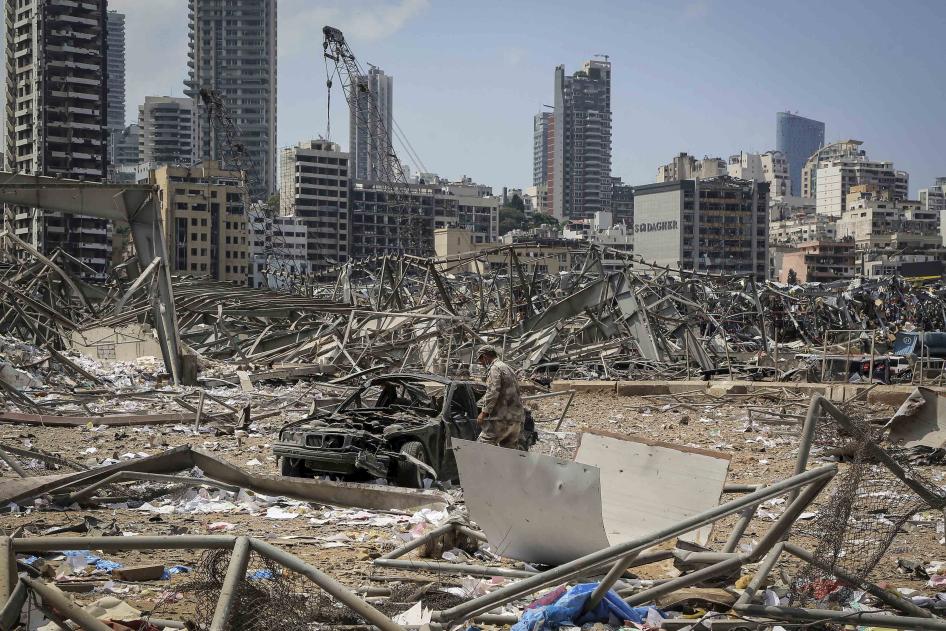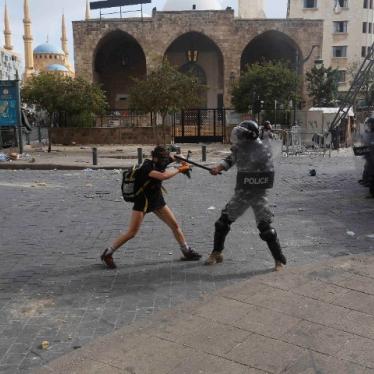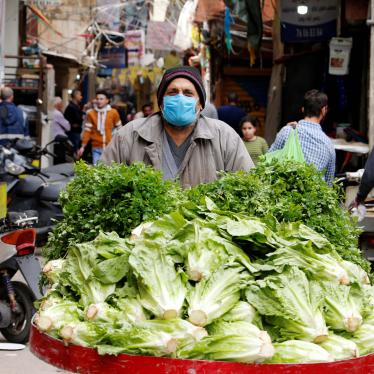Two days after the catastrophic August 4 explosion that devastated half of Beirut, Lebanon’s capital, and killed more than 200 people, President Emmanuel Macron walked through the city’s gutted streets. Surrounded by Beirut’s residents enraged over their leaders’ wanton disregard for their lives, Macron reassured them that, “I’m not here to help them, I’m here to help you.”
Macron said all the right things. He promised that much-needed aid would not fall into corrupt hands, he called for an international investigation and warned that “the time for responsibility has arrived,” and he insisted on the importance of political and economic reforms.
But almost four months later, there is hardly anything to show for Macron’s proclamations. Life for almost everyone in Lebanon has continued to get worse. More and more people are sliding into poverty, with over half the population struggling to afford basic necessities. The physical damage is still striking in the hardest-hit neighborhoods, scores of buildings are at risk of collapse, and thousands of families have still not been able to return home.
Even though senior Lebanese political and security officials knew about the presence of recklessly stored ammonium nitrate in Beirut’s port, none have been held accountable yet in a domestic investigation riddled with due process violations and allegations of political interference.
Lebanon’s leaders have not even been able to form a government. Instead, the same political leaders conduct business as usual and prioritize sectarian and clientelist considerations while the country falls apart.
Unfortunately, anyone in Lebanon could have told Macron that betting that the same political elite who have been robbing the country would carry out reforms that weakened their stranglehold wasn’t going to happen -- at least not without tremendous domestic and international pressure.
It is crucial that Macron doesn’t jettison his ambitious Lebanon plan as a “risky bet” that didn’t pay off. Releasing the pressure on Lebanon’s leaders now risks emboldening the corrupt political system – which France helped establish throughout history – and lends credence to these leaders’ claims that there is no alternative. It also risks further disillusioning an angry, disenfranchised citizenry who are increasingly choosing to emigrate as they lose hope for a better future in the country.
If Macron really wants to help the Lebanese people, he needs to take the punitive measures on those Lebanese leaders responsible for ongoing abuses that he promised in September and mobilize broader international support for them, including from the US and EU.
This starts with calling out the domestic investigation into the Beirut blast for what it is: a sham process aimed at shielding Lebanon’s political leaders from accountability and protecting the corrupt, dysfunctional system that enabled something as horrific and avoidable as the Beirut blast to happen.
Macron has backtracked on his initial support for an international investigation. Western diplomats told Human Rights Watch that they have adopted a “wait and see” approach, following the French lead. They said that they will judge the credibility of the domestic investigation when the results are announced and decide how to proceed. But there is nothing to wait for. The intrinsic flaws in the investigation all but guarantee that it will not yield any justice for a population anxious for answers and justice.
Macron needs to reiterate his first call and rally a large number of states to demand an international, independent investigation into the explosion, which also killed two French nationals and injured 21 others, to determine responsibility up to the highest levels. If Lebanese leaders can escape accountability when half the capital blew up, then they will feel no compunction about sabotaging reform initiatives and continuing their wholesale theft of the Lebanese people’s wealth while the country hurtles towards economic collapse.
At the same time, Lebanon desperately needs emergency aid to help residents deal with the fallout of the explosion and the economic crisis, especially ahead of the biting winter months. France will host a video conference on December 2 with international partners to solicit humanitarian aid for Lebanon.
Until there are credible reforms that ensure aid is not siphoned off to Lebanon’s leaders and their cronies, France, and other international donors should disburse aid to nongovernmental organizations that are willing and able to provide urgent services on the ground and develop due diligence criteria to ensure their assistance doesn’t end up in the hands of corrupt or abusive authorities. Human Rights Watch has proposed a system through which donors can coordinate aid and Lebanese groups can play a leadership role in decision-making and oversight.
Finally, Macron should move forward on sanctions against members of the political class who have rendered the domestic judicial system impotent. France should work with other countries to sanction leaders against whom there is credible evidence of corruption leading to human rights abuses, share this evidence publicly, and start the process of asset recovery. But if the international community is serious about combatting “systemic corruption in Lebanon” and supporting the Lebanese people’s calls for reform and accountability, the sanctions have to target officials responsible for abuses regardless of where they are on the political spectrum – not just those allied with Hezbollah.
Such an approach will demonstrate to members of the political class that there are real costs to the decades of abuse, and give space for leaders who genuinely want to start rebuilding and restoring rights that have been demolished under decades of rule by the current political class.











